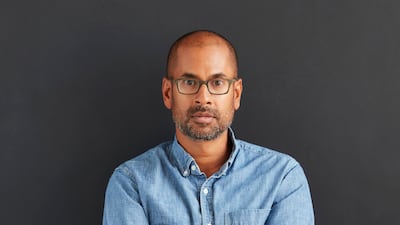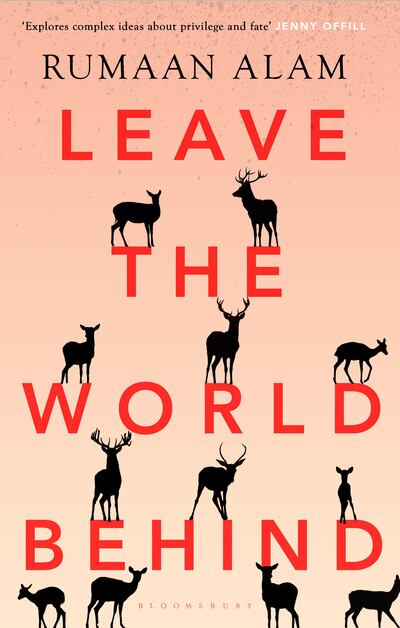When the end of the world as we know it comes about in Rumaan Alam's gripping third novel, Leave the World Behind, the two families brought together in the indulgent surroundings of a Long Island country retreat feel, well, uneasy. There's no big moment, no flash of white light, alien invasion or virus. Just a lack of mobile phone coverage and television, strange animal gatherings and, intermittently, a deafening noise. A noise to be "experienced, endured, survived, witnessed".
And so Clay and Amanda, on holiday in this luxurious setting with their children Archie and Rose, are a bit put out when their newsfeeds aren't working properly, and irritated when the wealthy black owners of the house, GH and Ruth, knock on the door to ask for refuge from a power outage elsewhere. Alam, the son of Bangladeshi immigrants, is brilliant on the subtle racism endemic in privileged white lives. "This didn't seem to her like the sort of house where black people lived," thinks Amanda. But they are forced together in lockdown-style isolation that becomes increasingly panicked.
If Leave the World Behind – which was pipped to America's National Book Award this week by Charles Yu's Interior Chinatown – sounds remarkably prescient, then the whole point of this novel is that we've had all the warning signs that things might be going wrong for some time, socially, economically, racially and ecologically. Most simply choose to look the other way.
"It's a strange place to inhabit, isn't it, when you glance at an alert on your phone telling you 250,000 people have now died from the coronavirus in the US, and you just continue going about your day," says Alam from his Brooklyn home. "It betrays the fact that you aren't ever really thinking about the world as a whole, you're thinking about your own personal space and stake inside of that. It's selfish and animal, in a way, which is a tough thing to reconcile.
"We all do it, though, and I'm not saying we shouldn't experience joy and pleasure in life. But it's getting harder and harder to turn away from inconvenient truths about the world – and perhaps the coronavirus can actually be that lever for talking about all these other issues."
What Leave the World Behind does so well is tap into our unease and insecurity about the present and the future. It explores racial identity and our dependence on technology, too, and because it stubbornly declines to illuminate the nature of the disaster in full, the reader ends up projecting on to the narrative the scenario that would most frighten him or her. Alam's novel is supremely, deliberately unsettling in that way.
“There is a way in which the book looks like a thriller or a horror novel,” he explains. It could, too, also be a middleclass novel of manners, a crime drama, or a satire on parenting and middle age. “It follows all of those conventions to a point,” he agrees. “But the satisfaction of an ending or an answer in those genres is not something I wanted for this book. In the real world, you’re not going to get Poirot gathering characters together in the drawing room and explaining everything; in reality, you don’t know the ending and, you know, that should frighten us.”
Alam admits, too, that one of the animating energies of the book was his fears for the future of his own children. So the horror and emotional resonance is not so much in what will happen to the satisfied adults who have enjoyed well-appointed existences. It’s how Archie and Rose, with their whole lives ahead of them, will cope in whatever the new reality is.
“For me, my children are the lens through which I see the world and I can’t help that,” he says. “The act of becoming a father was an act of wholesale change, of giving over my vanity, ego and fears to two other people. It’s a strange rewiring of your brain, a remarkable one.
“So thinking about the children in the book is chilling because it’s the horror of our reality. We’re witnessing a change in the global climate, so what kind of world will our children have to make? We don’t know the answer to that question. This is the very thing many politically engaged young people are talking about right now. It’s not theoretical to them, it’s actual. And that’s very scary.”
All of which might make Leave the World Behind seem grim, nihilistic even. Far from it. There is huge entertainment, in the suspense of what might happen next, black comedy and gentle satire. It's not a surprise that it's been optioned for a major Netflix film directed by Sam Esmail – the creator of hit drama Mr Robot – but it'll be fascinating to see how they deal with a line in the book that likens GH to Denzel Washington … given Washington is actually playing him.
"I privately really hope they are able to preserve that joke, but it's hard to know how it would work. There's poetry in the idea Denzel will be involved in this project, and Sam has such an appreciation for the territory of this book, of uncomfortable, possibly irresolvable problems. It'll be interesting to see how he can reconcile the book into the very different expectations of a medium that expects answers. But if anyone can do it, Sam can."
At least Alam does allow a small act of mercy at the very end, and he likens that inkling of hope to the relief he felt when Joe Biden won the US election.
So is Leave the World Behind a warning, a plea, to observe, listen and act? As GH points out in the book: No one could plead ignorance that was not wilful. You didn't have to scrutinise the curve to know; you didn't even have to read the papers because our phones reminded us many times precisely how bad things had got.
“Well, I’d be careful not to assume that I had any power of persuasion over a readership,” says Alam. “I simply wanted to look straight at the thing most of us spend a lot of time looking away from.”


